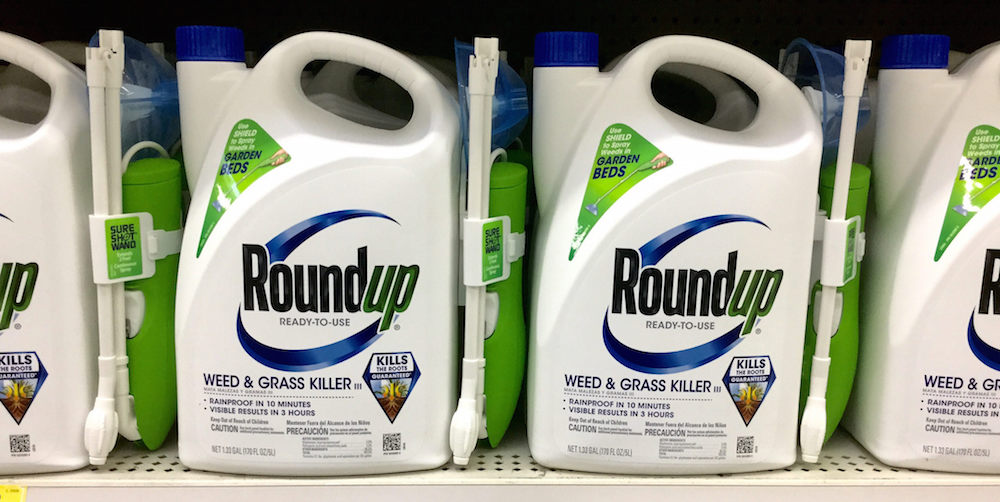Agrichemical giant Monsanto is currently facing lawsuits from people who claim that exposure to the company’s blockbuster product Roundup has caused cancer, specifically non-Hodgkin’s lymphoma and other cancers of the blood. The active ingredient in Roundup, glyphosate, is the suspected culprit. Roundup is the most widely used herbicide on the planet right now.
As part of this ongoing litigation, Judge Vince Chhabria has unsealed some of the documents that have been filed with the court. These documents appear to show that Monsanto had numerous contacts with regulators at the Environmental Protection Agency (EPA) during the time that the agency was supposed to be investigating the link between Roundup and certain cancers.
The New York Times provides the following summary of the exchanges revealed in the unsealed documents:
“The court documents included Monsanto’s internal emails and email traffic between the company and federal regulators. The records suggested that Monsanto had ghostwritten research that was later attributed to academics and indicated that a senior official at the Environmental Protection Agency had worked to quash a review of Roundup’s main ingredient, glyphosate, that was to have been conducted by the United States Department of Health and Human Services.
The documents also revealed that there was some disagreement within the E.P.A. over its own safety assessment …
In one email unsealed Tuesday, William F. Heydens, a Monsanto executive, told other company officials that they could ghostwrite research on glyphosate by hiring academics to put their names on papers that were actually written by Monsanto. ‘We would be keeping the cost down by us doing the writing and they would just edit & sign their names so to speak,’ Mr. Heydens wrote, citing a previous instance in which he said the company had done this.”
These documents could help shine some light on issues that had remained a relative mystery up to this point.
For example, why did the EPA determine in 1985 that glyphosate should be classified as a group C carcinogen — possibly cancer-causing in humans but lacking sufficient studies of humans and animals — only to reverse that decision six years later? Did it have anything to do with Monsanto’s influence over the agency, or did new studies emerge that cast doubt on previous conclusions? The latter seems less likely considering the fact that the bulk of independent research has reached the same conclusions about the existence of a probable link between Roundup’s glyphosate and cancers.
Another question that these documents could finally answer is why the EPA has been constantly at odds with the majority of the scientific community over the potential dangers of glyphosate. If, in fact, Monsanto was submitting ghostwritten research to the agency, which then failed to do its own testing, that might explain why the EPA has never found a link (beyond the original determination in the 1980s).
The answers to those questions may appear during the ongoing trials against Monsanto and as more documents are released from the trial.
But here are some things that we do know about the company’s activities that could have played a role in the government downplaying the link between Roundup and cancer: According to Open Secrets, Monsanto has spent more than $57 million since 2008 lobbying the federal government, the majority of which was spent on issues relating to agriculture and the food industry, issues that directly relate back to their blockbuster herbicide.
We also know that the International Agency for Research on Cancer (IARC) in 2015 classified glyphosate as “probably carcinogenic to humans,” though the European Food Safety Authority disagreed with its conclusion. The IARC is a World Health Organization cancer agency that is not the subject of lobbying, which lessens its likelihood of being corrupted by special interests.
The IARC decision on glyphosate was reached after careful review of independent studies conducted on the safety of glyphosate. Here are some of the health effects in either humans or animals that independent researchers have linked in some way to Roundup or glyphosate exposure, as reported by EcoWatch.com:
ADHD
Alzheimer’s disease
Anencephaly (birth defect)
Autism
Birth Defects
Brain Cancer
Breast Cancer
Cancer
Celiac Disease
Gluten Intolerance
Colitis
Depression
Diabetes
Heart Disease
Hypothyroidism
Inflammatory Bowel Disease
Liver Disease
ALS
Multiple Sclerosis
Non-Hodgkin Lymphoma
Parkinson’s Disease
Infertility
Respiratory Illnesses
The wide range of potential health effects — and researchers’ calls for additional study of them — points to the many unknowns and possible risks regarding the safety of glyphosate, which in the U.S. the EPA is responsible for assessing. As more information comes to light about Monsanto’s interactions with its regulators, how well the agency has been assessing these risks will likely surface as well.
Main image: Roundup Credit: Mike Mozart of TheToyChannel and JeepersMedia, CC BY 2.0
Subscribe to our newsletter
Stay up to date with DeSmog news and alerts







